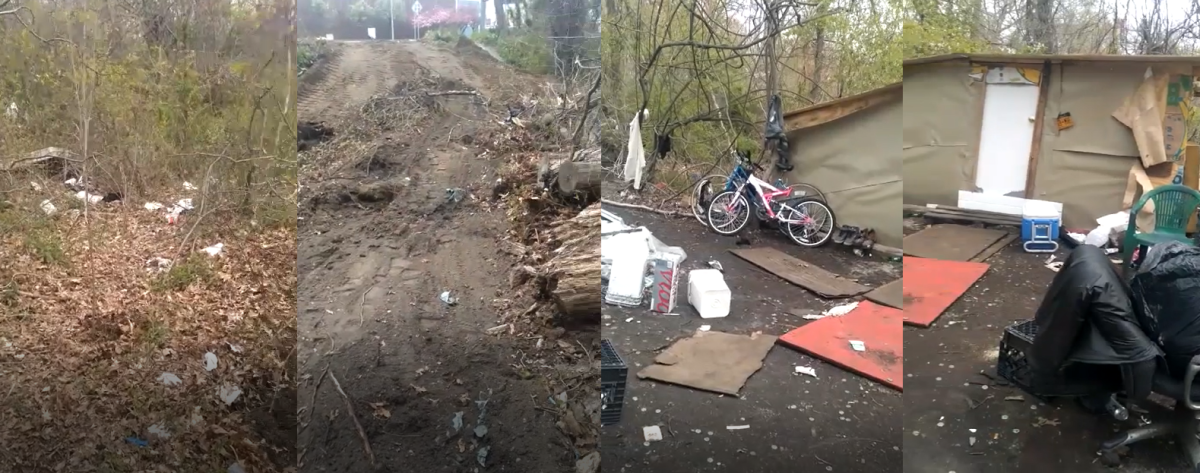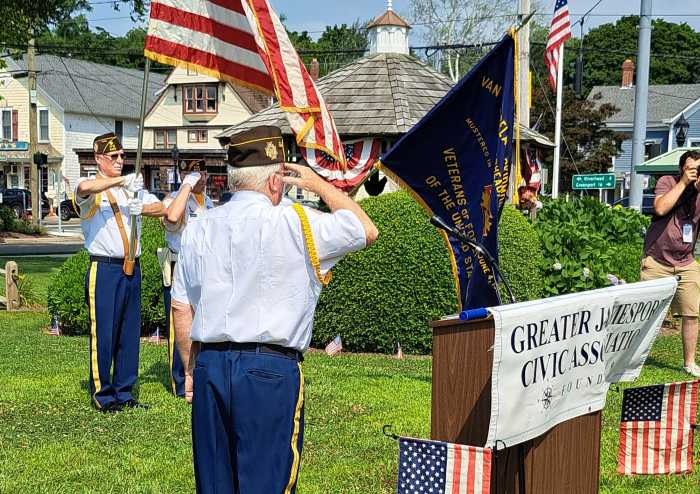The Village of Freeport recently removed a dozen day laborers who were living in shanties in a wooded area off Sunrise Highway, countering federal health guidance that recommends not clearing out homeless encampments during the coronavirus pandemic.
The day laborers — undocumented immigrants from El Salvador, Guatemala, and other Latin American counties — had lived for years in an area known as the Montaña, Spanish for The Mountain, but the village gave them 72 hours last month to gather their few belongings and get out. The village cited health and safety reasons for the move, but advocates said the encampment eviction will only worsen the COVID-19 crisis.
“We have no choice but to get you off the property,” the village wrote in notices taped to trees in the area, according to Noticia Long Island, the Press‘ Spanish-language sister publication.
Hispanics make up 14 percent of coronavirus fatalities in New York State despite only being 12 percent of the population statewide.
The encampment was nestled in a wooded area between Route 27, the Long Island Rail Road tracks, Meadowbrook State Parkway, and a public works yard.
“It is unfair because of the time they give us to leave,” Ariel Mérida, a Guatemalan immigrant who works as a boat cleaner, told Noticia. “Here we do not make any problems or anything. We just come to sleep, we do not offend anyone, we do not mess with anyone.”
Freeport Village Mayor Robert Kennedy, citing what he called unsanitary conditions in the woods, said the village cleared the day laborers out for health reasons.
“It was realized that it was very unsafe,” Kennedy told the Press. “I would assume as the COVID-19 epidemic hit that area you would have many fatalities under the conditions they were sharing.”
He noted that the village has cleared out the encampment before. Asked to comment on the CDC guidelines, the mayor referred the Press to the village’s attorney, Howard Colton, who said the village waws aware of the CDC guidelines but cleared the encampment to prevent the spread of coronavirus.
DECISION QUESTIONED
U.S. Centers for Disease Control and Precention guidelines suggest that clearing out homeless encampments can fuel the pandemic.
“Unless individual housing units are available, do not clear encampments during community spread of COVID-19,” CDC guidelines state. “Clearing encampments can cause people to disperse throughout the community and break connections with service providers. This increases the potential for infectious disease spread.”
The CDC instead recommends that those living in encampments be encouraged to set up their tents with at least 12 feet apart from one another. It also recommends providing portable latrines for encampments of more than 10 people if bathrooms are not available. Mayor Kennedy said village police referred the men to service providers, but advocates say the day laborers are still living outdoors.
“Breaking them up is the opposite of the federally recommended guidelines,” Greta Guarton, executive director of the nonprofit Long Island Coalition for the Homeless, told the Press. “Guidelines in light of COVID are actually to allow people to remain where they are because it is the safest place for them and is it safer for the community for them to remain.”
Nadia Marin-Molina, co-executive director of the California-based nonprofit National Day Laborer Organizing Network (NDLON), which has worked to assist the Freeport day laborers, echoed Guarton’s concerns.
“It’s unconscionable for the mayor to bulldoze those encampments in the middle of a pandemic,” Marin-Molina told the Press. “Destroying the one place that they had … basically just pushes them away.”
ANYWHERE THEY ROAM
The former residents of the encampment say finding a new place to stay is difficult as finding work during the pandemic.
“The eviction … affects us a lot because right now there is no work,” Narciso Cruz, another day laborer living in the Montaña who immigrated from from El Salvador 14 years ago, told Noticia. “I do a little of everything but I lost my job. That’s why we make these little houses in the bush, because there is no other resource.”
Due to the pandemic, he was suspended from his jobs in painting and construction. And he’s not alone.
“I have friends who are going to stop at Home Depot to look for work, but with this virus nobody gives them anything,” Samuel García, a day laborer from El Salvador who lived in the Montaña for four years until the village cleared him out, told Noticia while wearing a mask to avoid the spread of COVID-19.
TRAILER TROUBLE
For the men evicted from the Montaña, one of the few sources of support they had was a mobile office known locally as “the Freeport Trailer” that served as a day laborer hiring site at the end of Bennington Avenue, a short walk from the encampment.
At the site, about 30 to 50 people received free breakfast six days weekly, food donations, and programs such as construction health and safety training, offered by the Merrick-based nonprofit CoLoKi.
“There one went to have breakfast, we could prepare our food, charge the phone,” García told Noticia. “We had a lot of support from the organizations.”
The trailer was run by CoLoKi, led by its founder Liz O’Shaughnessy, and later by Mirna Cortes, who began working there in 2014 and recently assumed interim management of the facility shortly before it was shut down. CoLoKi was distributing food to day laborers with the support of the Island Harvest food bank, but in March Freeport notified the group that they had to vacate the trailer. O’Shaughnessy says the village moved the trailer without the group’s permission.
“Liz notified me that the trailer was going to close and then we stopped operating on April 6,” Cortes told Noticia. “Everything was closed completely. Then they informed me that they already removed the trailer from the place, it no longer exists. Everything was very fast.”
Mayor Kennedy and Colton, the village attorney, said the trailer was removed because the day laborers weren’t practicing social distancing.
“As the trailer was the site of multiple violations of the public health law of the state of New York, the executive orders of Governor Cuomo, and was a clear and present danger to the health, welfare, and safety of the occupants during this pandemic, the village removed the trailer,” Colton said. “As a result, the village is in the midst of a criminal investigation into the actions of the owners of the trailer, and will either be handling the matter through the Freeport Village Court or referring our investigation to the District Attorney’s Office for prosecution.”
But Marin-Molina of NDLON said the village could have advised the day laborers to stay six feet apart and wear masks instead of ending the trailer services.
“If the Village of Freeport doesn’t take care of its most vulnerable people — the homeless, day laborers, etc. — then they’re not just hurting those workers, they’re hurting everybody,” she told the Press. “Because as those workers get sick, everybody in the community gets sick, and the disease spreads. It’s also about the health of the entire community, not just one group of individuals.”
–With additional reporting by Walter Garcés
Correction: An earlier version of this story reported that the Freeport trailer was owned by the village. The trailer was owned by CoLoKi.
Related Story: Despite Progress, Homelessness and Hunger Persist on Long Island
Related Story: In Long Island Community With Most Coronavirus Cases, Brentwood Day Laborers Say: ‘If The Virus Doesn’t Kill Us, Hunger Will’
Related Story: Despite Being The Most Affected Minority, Hispanics Doubt The Pandemic
Related Story: Tests Target Long Island Minority Communities Dubbed Coronavirus Hot Spots
For more coronavirus coverage visit longislandpress.com/coronavirus
Sign up for Long Island Press’ email newsletters here. Sign up for home delivery of Long Island Press here. Sign up for discounts by becoming a Long Island Press community partner here.




























